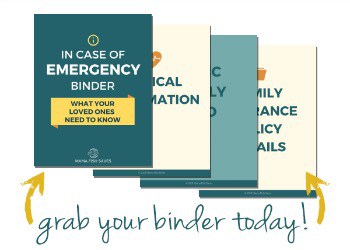Financial Checklist for the Newly Married
(This page may contain affiliate links and we may earn fees from qualifying purchases at no additional cost to you. See our Disclosure for more info.)
Congratulations! You just got married! Maybe you even tied the knot without spending a fortune (now that is truly a feat). Regardless, you managed to get married in the middle of a global pandemic, so you deserve major kudos.
Now what?
As a newly-christened household, there are financial steps you and your partner need to take to make sure you’re legally and financially starting off on the right foot.
Newlywed Legal and Financial Considerations

Changing Your Name
Ahh, the romantic considerations of… a name change.
In Western culture, a woman has traditionally taken the last name of her partner. In Latin America, Asia, and many other parts of the world, women retain their maiden names for their entire lives.
Nowadays, things have changed a bit–your partner may take your last name, you may both keep your last names, or you may hyphenate.
Whatever you decide, you’ll need to make your new names legal as one of the first tasks of married life.
If you’re changing your name, you won’t be able to set up a new joint bank account, get a passport, or put your name on a joint house title without updating certain legal documents.
After getting married, your first step to changing your name is getting a copy (or two) of your marriage license.
The officiant who performed your ceremony should have given you a copy when you got married. But if not, you can request a copy from the Vital Records Office in the county where you got married.
Then, you can apply online or in-person to update your Social Security card. Once your Social Security card is updated, you’ll need to make a trip to the good ‘ole DMV and get your license changed.
Eventually, you’ll also need a new passport (remember those?). For a name change on your passport, fill out a name change application and apply by mail.
Others who will need to Know
Additional places or documents you may need to update or notify of your change in name and marital status include:
- Employers, including benefit, payroll, and W-2 documents
- Banks/Financial Institutions
- Insurance Companies
- Utility Bills
- Doctor/Dentist Offices
- Professional Licensure
- Professional Associations
- Educational Institutions
- Estate Planning Documents
- Social Media Accounts
Merging Your Money
Once you’ve taken care of any necessary name changes, it’s time to make some decisions about how your new household will merge and manage your personal finances.
There are several ways newlyweds can tackle this.
- Keep separate finances.
- Keeping individual bank accounts and splitting all your bills in half may seem simple and easy. And it can be. This approach works best if you make similar incomes; otherwise, it might feel unfair to the partner with the lower income.
- Another approach would be to keep bank accounts separate but pay the percentage of bills proportionate to your incomes. For example, if you make $70,000 and your husband makes $30,000, you would pay 70% of the mortgage and other bills, and he would pay 30%.
- Combine your money.
- With this method, you’ll need to make sure both of your names are on the account. Whose bank should you use? Now could be an excellent time to open a new joint checking and savings bank account. While you're at it consider taking advantage of one of the many bonuses offered for starting a new account.
- Be sure to update any direct deposit or automatic bill payments as well
This is also a good time to figure out who's paying what.
- Can one income pay all of the bills, and the other income saved and invested?
- Will you continue to each pay the bills you paid before you got married?
- Will your new partner take on some of your debt payments (or you, theirs), such as student loans or credit card debt, to help get those paid off faster?
While you may be tempted to make ad hoc decisions now and revisit these sometimes uncomfortable choices later, remember to begin as you intend to go on.
That is, think about how you would like your bill-paying and finances to look. Then make the hard decisions now, at the beginning of your relationship, about how you'll divide spending, saving, and investing decisions.
Merging Insurance Plans
While you’re deciding how to combine finances, don’t forget to talk about combining insurance.
Now that you’re married, there’s a good chance it will be cheaper to sign up for one partner’s health insurance plan and add the other as a spouse. One of you may even get a “buy-out” for not using your employer’s health insurance benefit.
The same is true of auto and renters or home insurance. You may save significant amounts of money by adding both cars and a home as part of an umbrella plan rather than having individual plans.
Setting Up Beneficiaries
Don’t forget about changing the beneficiaries on your retirement savings and insurance accounts, either.
You'll need to update the beneficiaries on any 401K, IRA, and/or taxable investment accounts you have.
If you have a life insurance policy or other insurance accounts, make sure to change the beneficiaries there as well.
Typically, this is as simple as logging in to your online account, clicking through to your account settings, and finding the “Beneficiaries” tab to change your designated recipient.
Property Titles
Did you move into your spouse’s home or they yours after marriage? If either of you is moving, you may consider changing the house’s title to represent joint ownership, especially if one partner is helping pay the mortgage.
You may also decide to put both of your names on your vehicles for similar reasons. Make sure you’re setting up ownership of your joint assets to reflect the combined payment.
It’s probably wise to set aside an entire weekend to see to all of these newlywed legal and financial changes, especially since you can handle most of these logistical formalities online.
Take a few hours to gather all of the documents you’ll need, then take care of all of the boring bureaucratic details at one time.
Budgeting
One of the best gifts you can give your new marriage is the gift of financial transparency.
While you may not be a fan of budgets, or may not have tried one before, consider budgeting as a way to start a solid financial future with your partner.
It's a guided way to make spending decisions that may help you better decide the who, when, and how of bill-paying and other financial decisions.
There are several free budgeting apps available, such as Mint and Personal Capital.
These apps allow you to sync your financial accounts and automatically download each transaction in your banking and credit card accounts. Then, all you have to do is categorize each expense.
These free apps work great as records for how you’ve spent your money. Yet, for a more proactive solution about where you should spend future dollars, consider a paid option like Tiller Money or YNAB, You Need a Budget.
The paid apps allow you to make decisions about where you’d like your newly-joined finances to go, as well as track your spending during the month.
How do newlyweds start budgeting together?
First of all, keep your expectations realistic. Budgeting is a process that you learn over time, like anything else. And you won’t necessarily be great at it at first.
You may also have to adapt to a different spending style. You may be a natural saver, while your partner is a spender, or vice-versa.
There are bound to be some conflicts as you learn to navigate money together. Still, planning a budget together is a great way to alleviate money-based stress down the road.
You'll need to determine how much you currently spend in monthly budgeting areas like food, rent, utilities, and gasoline.
You will also need to figure out how much your periodic expenses cost, i.e. car and renters or home insurance. Then you can plan for those costs ahead of time to avoid taking on debt for expenses you can reasonably expect.
Once you understand your combined monthly income and expenses it'll be much easier to create a budget that works for you both.
Creating and tracking future financial goals, such as building an emergency fund or buying your first home together, will also be easier when you have a budget you both agree on and stick to.
It may take a few tries before you find a budgeting method that works for you newlyweds. But keep at it and avoid these common mistakes to create a spending plan that helps you build your savings and investments as well.
The Filing System
You may consider updating your organizational system for all the new financial documents you’ll have as a married couple.
While this could be a virtual system, there are several essential paper documents you will need to keep, so an old-fashioned folder system may work best.
Your filing system needs the following sections:
- Legal Documents
- Retirement Accounts
- Bank Accounts
- Credit Card Accounts
- Insurance
- Tax Returns
- Estate Planning
You may also end up with a hybrid system where you maintain:
- a special drawer, lockbox, or safe for paper copies of your important legal documents like social security cards, passports, tax receipts, wills, and power of attorney papers
- laptop folders where you save copies of your insurance policies, tax returns, and bank statements.
No matter how you set it up, make sure your folder system is clearly marked and easily accessible for both of you.
Your partner should know exactly how to find all of your household’s most important documents, and both of you should be able to access a list of accounts, access information, and usernames and passwords. This may prove invaluable in an emergency situation.
Money Dates
While there are many financial considerations to figure out in the first few months of your marriage, there are plenty of ongoing questions you’ll have to tackle as a married couple.
You’ve probably heard the statistic that money is the biggest source of fights for married couples. To avoid that, you might consider treating your money like a joint responsibility–as big a responsibility as, say, a pet.
Just like you have to put time and attention into your pet parenting responsibilities, you need to spend time and attention caring for your finances.
A great way to ensure regular conversations about your money is during a monthly money date.
When you’re using a household budget, a money date is a great time to make decisions about your upcoming monthly budget, as well.
Set up an automatic notification on your phone for your money dates, then have fun with it. Go out for pizza at your favorite spot, set up the fire pit, or pull out a bottle of wine.
Make your money date something to look forward to, rather than dread.
While you will inevitably have disagreements about how you spend your funds, regular communication early on in your marriage will keep money from becoming a taboo subject.
You also don’t want to get in the habit of hiding spending from your spouse. Such behavior is guaranteed to cause problems in a relationship. Avoid hiding or lying about money and spending, even if your spouse isn’t in 100% agreement with it.
Schedule It
Setting up a regular time to talk about your money and financial plans can help you develop open, honest communication, even about as tricky a topic as your money.
During your conversations about your finances, you'll want to look at:
- short-term money goals (1-3 years)
- mid-term financial goals (3-9 years)
- long-term financial goals (10+ years)
- individual and combined life goals (career, family, etc.)
These financial talks should also include fun stuff, like planning for financial independence, starting a family, and big trips you’d like to take.
Set aside time during your dates to dream about major purchases, ideas for entrepreneurship, or other hopes and dreams.
Sorting out your financial life as newlyweds can feel as potentially complicated as planning your wedding.
But never fear–with a long-term outlook and regular meetings to plan, you and your new marital partner can set yourselves up for a lifetime of solid financial decisions that will underpin a healthy, successful relationship. Mazel tov!

Article written by Laurie
Laurie is a team member of Women Who Money and the founder of The Three Year Experiment, a blog about building wealth in order to become location independent.

